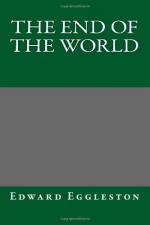“Why don’t they set these blacklegs ashore?” said August, whose love of justice was strong.
“You tell,” drawled the mud-clerk. “The first clerk’s tried it, but the old man protects ’em, and” (in a whisper) “get’s his share, I guess. He can set them off whenever he wants to.” (I must explain that there is only one “old man” on a steamboat—that is, the captain.)
By this time Parkins had turned and thrown his cards so that everybody knew or thought he knew where the ace was. Smith, the man with the white hat, now rose five dollars more and offered to bet fifteen. But Parkins was more indignant than ever. He told Smith to go away. He thrust his hand into his pocket and drew out a handful of twenty-dollar gold-pieces. “If any gentleman wants to bet a hundred dollars, let him come on. A man who couldn’t lose a hundred would better keep still.”
Smith now made a big jump. He’d go fifty. Parkins wouldn’t listen to fifty. He had said that he wouldn’t bet less than a hundred, and he wouldn’t. He now pulled out handful after handful of gold, and piled the double-eagles up like a fortification in front of him, while the crowd surged with excitement.
At last Mr. Smith, the near-sighted gentleman in spectacles, the gentleman who wore black crape on a white hat, concluded to bet a hundred dollars. He took out his little porte-monnaie and lifted thence a hundred-dollar bill.
“Well,” said he angrily, “I’ll bet you a hundred.” And he laid down the bill. Parkins piled five twenty-dollar gold-pieces atop it. Each man felt that he could lift the ace in a moment. That card at the dealer’s right was certainly the ace. Norman was sure of it. He wished it had been his wager instead of Smith’s. But Parkins stopped Smith a moment.
“Now, young man,” he said, “if you don’t feel perfectly able to lose that hundred dollars, you’d better take it back.”
“I am just as able to lose it as you are,” said Smith snappishly, and to everybody’s disappointment he lifted not the card everybody had fixed on, but the middle one, and so lost his money.
“Why didn’t you take the other?” said Norman boastfully. “I knew it was the ace.”
“Why didn’t you bet, then?” said Smith, grinning a little. Norman wished he had. But he had not a hundred dollars of his own, and he had scruples—faint, and yet scruples, or rather alarms—at the thought of risking his employer’s money on a wager. While he was weighing motive against motive, Smith bet again, and again, to Norman’s vexation, selected a card that was so obviously wrong that Norman thought it a pity that so near-sighted a man should bet and lose. He wished he had a hundred dollars of his own and—There, Smith was betting again. This time he consulted Norman before making his selection, and of course turned up the right card, remarking that he wished his eyes were so keen! He would win a thousand dollars before bed-time if his eyes




